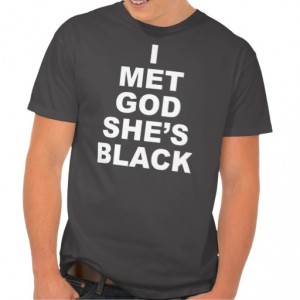I Met God, and S/He’s a Cultural Construct

To humanists, attempts to define or understand the nature of a deity can appear meaningless. Why bother to attempt to explain something that does not exist? Shouldn’t we focus on real-world, material problems that affect living people instead of speculating about the nature of the mythical? However, even if God doesn’t exist, how our culture portrays the divine does strongly indicate what and who we value, making it a topic that should engage nontheists who are concerned about social inequality. Discussions about racism, sexism, and the existence of God, for instance, are currently happening around t-shirts and posters that read: “I Met God, She’s Black.”
New York artist Dylan Chenfeld, described as a “Jewish atheist” by The Huffington Post, has been creating and selling merchandise on his website that challenges Western culture’s common perception of God as a white, male deity. Though Chenfeld declined comment for TheHumanist.com, The Huffington Post quotes him as saying, “I like poking fun at sacred cows…I’m taking the idea that God is a white male and doing the opposite of that, which is a black woman.” His t-shirts and the statement they make have become surprisingly controversial, as many viewers seem reluctant to conceptualize the divine as a woman of color. Regardless of the reactions it has generated, the sentiment behind Chenfeld’s art is not new. People have frequently attempted to explain or define deities in common terms that make them seem, well, less deified. By picturing God in more human, familiar terms, the divine can seem more accessible and friendlier. Songs such as Joan Osborne’s “One of Us” and movies such as the 2002 film Joshua, among many other forms of storytelling, all attempt to make the divine less abstract and more familiar by presenting it as more human. By bringing God down from a holy place in the heavens, human beings can feel more connected to something larger than themselves.
In the African-American literary tradition, however, this connection to the divine takes on a more political meaning, especially in works by women authors. Much of the African-American literary tradition comments on the pervasive racism and sexism that continues to exist in American society, and many poems and short stories from this genre focus on empowering women of color who have been made to feel that they are less than human because of their race and gender. For example, in Octavia Butler’s sci-fi short story, “The Book of Martha,” a black woman has a face-to-face conversation with God during which the deity’s face gradually changes and eventually mirrors her own as she grows to trust her own wisdom and perspectives. Ntozake Shange’s series of poetic monlogues, for colored girls who have considered suicide/when the rainbow is enuf, describes God not only as a black woman but as a presence existing within oneself. In these literary works, presenting God as a black woman and as a reflection of the authors themselves not only makes the divine more accessible but also instills the protagonists with a personal sense of power and dignity that they did not previously possess. This literary tradition is echoed in Chenfeld’s “I Met God, She’s Black” t-shirts.
With these varying interpretations of the divine in mind, humanists should not simply dismiss controversial attempts to personify God. While humanists might not believe that God exists as an objective entity, how our culture portrays this mythical being certainly says a lot about what and who we view as powerful and worthy. The common perception of God as a white man suggests that we ascribe characteristics of white men to the divine, and vice versa. It suggests that we see white men as authoritative, as elevated, as god-like. Everyone else, then, is somehow lesser. Causing people to question this unspoken perception of God by wearing a t-shirt with the slogan “I Met God, She’s Black” can also cause people to question the social hierarchies of racism and sexism that are, sadly, still present in our culture. It can also encourage people to question the existence of a deity or divine presence entirely, since it draws attention to the ways in which our concept of God is based not in objective fact but on our specific cultural moment.
All things being relative, what does your shirt say?
